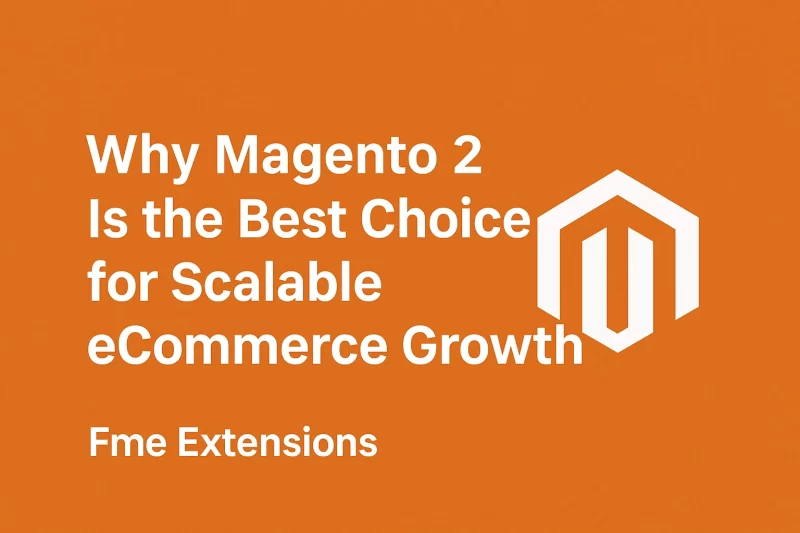When it comes to success in eCommerce, most of us assume that the product and pricing matter more than anything else. However, this is not the case as the choice of the eCommerce platform is an equally important choice. The right platform can make everything smoother, from the marketing to the checkout experience. When selecting an eCommerce platform, don’t just focus on the pricing.
Why?
A platform may be cheaper upfront but after considering the customisations, extensions, maintenance, and hosting costs, it may turn out to be the most expensive choice. Likewise, merchants often ignore the scalability aspect of the platform. Resultantly, they end up selecting a platform which cannot support the store’s growth, forcing the store owner to migrate to another platform.
Merchants must realise that as competition intensifies, they must select platforms which support expansion and adapt to ever-evolving demands. This is where Magento 2 comes in. It is widely regarded as the best choice for brands that seek long-term success. By partnering with a specialist Magento 2 Development Agency, you can unlock Magento 2’s full potential, making growth faster and smoother.
What Makes Magento 2 the Best Choice for Scalable eCommerce Growth?
Don’t just assume that Magento 2 is a shopping cart solution as it much more. It is a full featured platform that offers advanced features that are designed to support businesses as they expand. From the customisation to performance and enterprise-grade scalability, Magento provides everything a modern eCommerce brand needs to flourish.
- Performance and Speed
Magento 2 was created with performance and speed in mind. This is why you’ll see various performance and speed-oriented features built into the platform. For instance, full-page caching often requires a dedicated plugin in other platforms, but Magento 2 has this feature out of the box. Similarly, Magento 2 is known for its optimised indexing and efficient database handling.
The result?
A faster online store that can handle thousands of visitors simultaneously without compromising on the performance. This is crucial for several reasons, including the fact that Google uses the page loading times as a factor in its search rankings algorithm. Apart from this, customers are likely to bounce from a slow loading website to a faster one.
We recommend that you engage a professional Magento 2 Development Agency to further fine-tune the performance and speed settings in your Magento 2 store. Given their vast experience and resources, they know exactly which areas to focus on, generating the greatest impact. Your users will enjoy top performance even during the peak sales periods.
The below table compares Magento 1 and Magento 2 to provide you an idea of Magento 2’s performance improvements:
| Feature | Magento 1 | Magento 2 |
| Page Load Time | Slower, average 4–6 sec | Faster, under 1.5 sec |
| Database Handling | Limited optimisation | Advanced optimisation |
| Checkout Process | Lengthy and complex | Streamlined, faster checkout |
| Traffic Handling | Moderate capacity | High capacity and scalable |
Magento 2 is certainly better for businesses looking to grow in a highly competitive market.
- Ecosystem and Community Support
Another reason which makes Magento 2 ideal for scalable eCommerce is its ecosystem and community support. Since its acquisition by Adobe, merchants can integrate their Magento stores with Adobe tools, including the Adobe Experience Manager and Adobe Analytics. These advanced tools provide deeper insights, allowing you to make data-driven decisions.
Apart from this, there are thousands of developers, agencies, and solution providers that are continuously working on Magento 2. Therefore, you benefit from extensions, custom development, and a lot more. If you go to the Adobe Marketplace, you’ll see how much options you have available in every area. For instance, just for SEO, you have hundreds of Magento 2 extensions.
It is important to consider how Magento 2 compares against other platforms. For this purpose, consider the below table:
| Feature | Magento 2 | Shopify | WooCommerce |
| Scalability | High, enterprise-level | Moderate, limited by plan | Moderate, plugin-heavy |
| Customisation | Extensive and flexible | Limited by themes/apps | High, but requires plugins |
| Multi-store Functionality | Built-in | Limited | Limited |
| International Capabilities | Strong, multilingual, multicurrency | Moderate, some restrictions | Dependent on plugins |
| Security | Enterprise-grade | Platform-managed | Varies with setup |
Aa you can see for yourself, Magento 2 is perfect for larger stores whereas Shopify and WooCommerce are made for small to medium stores.
- Security
The topmost concern for any online store is the security. A single breach can undo years of hard works. Consider KNP, a transport company based in the UK. Hackers managed to guess an employee’s weak password and gain access to business-critical data. After being unable to pay the ransom, the 158-year-old company ceased operations. It goes to show how important it is to have robust cybersecurity systems and policies in place.
For a growing store, safeguarding sensitive data becomes a challenging task. However, Magento 2 offers enterprise-level security measures which makes safeguarding the data easier. The features include strong data encryption, PCI compliance, and two-factor authentication. In addition, the company regularly issues security patches, fixing potential vulnerabilities. By hiring a skilled Magento 2 Development Agency, you can set up additional protective measures.
- Scalability Features
The one reason that Magento 2 is able to support your business growth is because of its modular structure. Whether you have thousands or hundreds of thousands of products, you can manage them with quite ease. From bulk uploads to advanced product categorisation, you’ll find that Magento 2 ensures that inventories remain highly organised. The below table compares Magento 2’s scalability features with other platforms:
| Feature | Magento 2 | Shopify | WooCommerce |
| Multi-store Management | Built-in, centralised | Limited, separate setups | Plugin-dependent |
| Multilingual Capabilities | Native and extension-ready | Limited, via apps | Requires third-party plugins |
| Multicurrency Support | Strong, enterprise-grade | Partial, plan-restricted | Plugin-dependent |
| Large Catalogue Handling | Designed for 100k+ SKUs | Moderate, slower at scale | Can slow with large SKUs |
| High Traffic Resilience | Optimised for enterprise | Restricted by plan tiers | Dependent on hosting |
Again, Magento 2 is the clear winner since it can support global operations.
- Customisation
Large stores or those looking towards rapid expansion have unique needs which cannot be met with existing solutions or tools. In other words, they require custom solutions. Shopify, WooCommerce, and most other platforms are customisable but only to a certain extent. This can be a limitation for stores whose success depends on the custom development work.
Magento’s modular structure means you can create stores and custom features that match your unique requirements. From the storefront to the checkout experience or even integrating advanced CRMs, Magento allows you to do everything. This allows store owners to offer unique experiences to their users and adapt to the market trends quickly.
Final Thoughts
This concludes our article on why Magento 2 is the best choice for scalable eCommerce. As you can see, Magento 2 offers a wide range of benefits, including its unlimited customisation options, integration with the wider Adobe Ecosystem, and robust security. However, do keep in mind that Magento 2 has a steep learning curve and can be difficult to find your way around.
Therefore, if you don’t have an in-house, your best option is to hire a professional Magento 2 development agency. Whether you wish to migrate your store to Magento 2 from another platform or implement a custom solution, they have the resources and expertise to carry out the work. Nevertheless, do check the reviews and ask for past project to determine the suitability.



